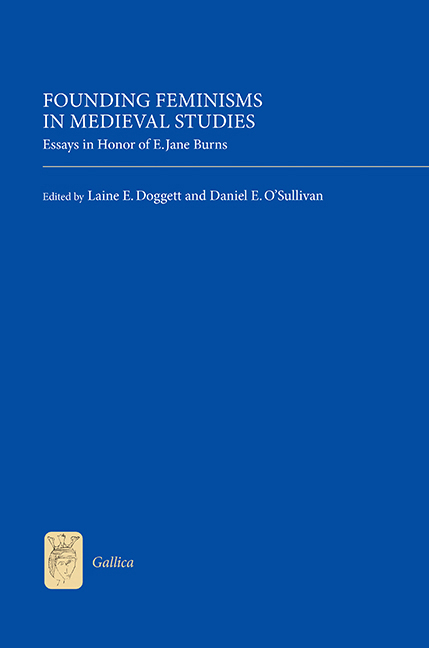Book contents
- Frontmatter
- Contents
- List of Illustrations
- List of Contributors
- Acknowledgements
- Introduction: The Work of E. Jane Burns and the Feminisms of Medieval Studies
- E. Jane Burns: A Bibliography
- Part I Debating Gender
- Part II Sartorial Bodies
- Part III Mapping Margins
- Part IV Female Authority: Networks and Influence
- Anne de Bretagne and Anne de France: French Female Networks at the Dawn of the Renaissance
- Staging Female Authority in Chantilly MS 522: Marguerite de Navarre's La Coche
- Babies and Books: The Holy Kinship as a Way of Thinking About Women's Power in Late Medieval Northern Europe
- Page Layout and Reading Practices in Christine de Pisan's Epistre Othea: Reading with the Ladies in London, BL, MS Harley 4431
- Afterword: A Response to the Volume
- Index
- Tabula Gratulatoria
- Already Published
Staging Female Authority in Chantilly MS 522: Marguerite de Navarre's La Coche
from Part IV - Female Authority: Networks and Influence
Published online by Cambridge University Press: 05 July 2016
- Frontmatter
- Contents
- List of Illustrations
- List of Contributors
- Acknowledgements
- Introduction: The Work of E. Jane Burns and the Feminisms of Medieval Studies
- E. Jane Burns: A Bibliography
- Part I Debating Gender
- Part II Sartorial Bodies
- Part III Mapping Margins
- Part IV Female Authority: Networks and Influence
- Anne de Bretagne and Anne de France: French Female Networks at the Dawn of the Renaissance
- Staging Female Authority in Chantilly MS 522: Marguerite de Navarre's La Coche
- Babies and Books: The Holy Kinship as a Way of Thinking About Women's Power in Late Medieval Northern Europe
- Page Layout and Reading Practices in Christine de Pisan's Epistre Othea: Reading with the Ladies in London, BL, MS Harley 4431
- Afterword: A Response to the Volume
- Index
- Tabula Gratulatoria
- Already Published
Summary
In 1541, in the midst of protracted marriage negotiations on behalf of her young daughter, Marguerite de Navarre penned a 1401-line love debate poem, commissioned a series of eleven illustrations for it, and gave an illuminated copy of the manuscript to Anne de Pisselieu, Duchesse d'Estampes, the mistress of Marguerite's brother, King François I. Chantilly MS 522, which we will examine here, is one of two extant illustrated manuscripts of this poem. Written at a difficult time during Marguerite's life, La Coche dramatizes the self-imposed exile of the poet, Queen of Navarre, in the countryside, where she encounters three grieving women who describe their unhappiness in love, each advancing particular reasons for being the most miserable in a unique style of versification and rhyme. As they take refuge from the rain in a coach and journey back to court, the women argue about who should judge the debate, which Marguerite has agreed to write down; the matter concludes with Marguerite's presentation of her book to the Duchess, who will read it with the King. The book thus stages a mise-en- abyme of its creation and transmission, and seems to mark, for its author, a watershed in her literary career. Marguerite de Navarre includes La Coche in the first printed edition of her collected works, where it is the only fully illustrated work. After La Coche, she writes more often in a secular mode; shortly after this time, she may have begun to pen some of the tales for the Heptaméron, which was published posthumously.
For its querelle among female voices about courtly love, La Coche has long been recognized as a precursor to the Heptaméron. Renaissance critics have examined its valorization of female friendship and its dramatization of a community of women offering support to a woman writer who takes up her pen in their interests. The illustrated manuscript, Chantilly MS 522, executed by the artist identified as the Parisian Master of François de Royan,49 has been hailed as a precious example of a Renaissance illuminated manuscript that depicts its female author. Perhaps just as remarkable are three unadorned manuscripts with prose “legends” providing detailed instructions for the artist inserted where the images should be; many critics believe that Marguerite wrote these instructions herself.
- Type
- Chapter
- Information
- Founding Feminisms in Medieval StudiesEssays in Honor of E. Jane Burns, pp. 187 - 204Publisher: Boydell & BrewerPrint publication year: 2016



